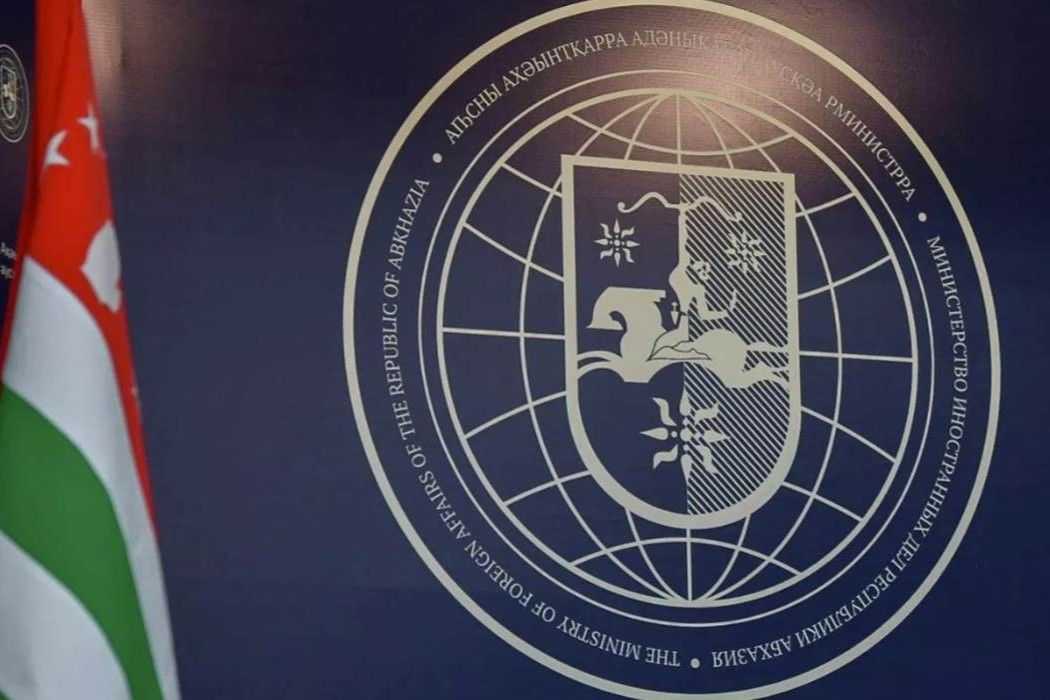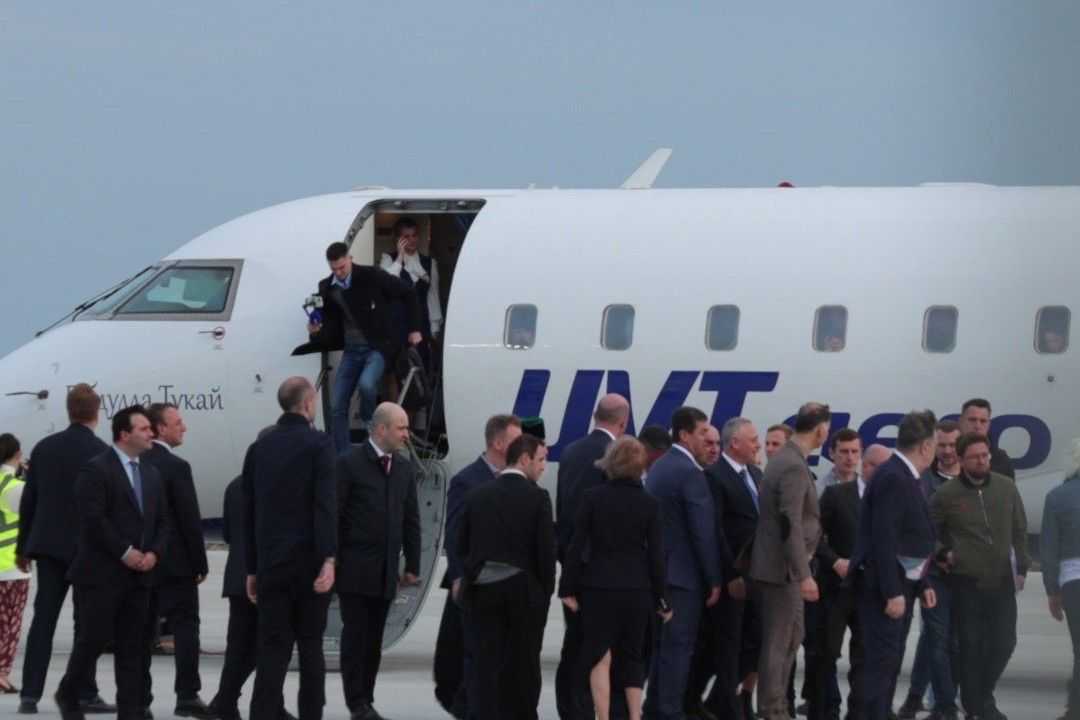
Parliamentary elections in Abkhazia over the weekend have ended inconclusively, with the final makeup of the legislature expected to take shape after runoffs in around half of districts later this month.
On 12 March, Abkhazia voted for the seventh convocation of the 35-seat parliament.
The results of Saturday’s vote revealed only half of the makeup of the incoming parliament, where the lawmakers will face the fallout of Moscow’s diminished financial support to the region following the financial crisis in Russia.
Announcing the preliminary results on Sunday, the local Central Election Commission (CEC) reported the winning MPs in 17 out of 35 single-mandate majoritarian districts (at least two ran unopposed), sending 17 other seats to runoffs within the next two weeks.
There will also be a repeated vote within two months’ time in the Gudauta electoral district, where the CEC said there was insufficient turnout. Former Prime Minister Leonid Lakerbaiya (2011-2014) is among the candidates in the district.
According to the CEC, 51% of around 132,000 eligible voters took part in the elections while the turnout threshold to consider the election valid was 25%.
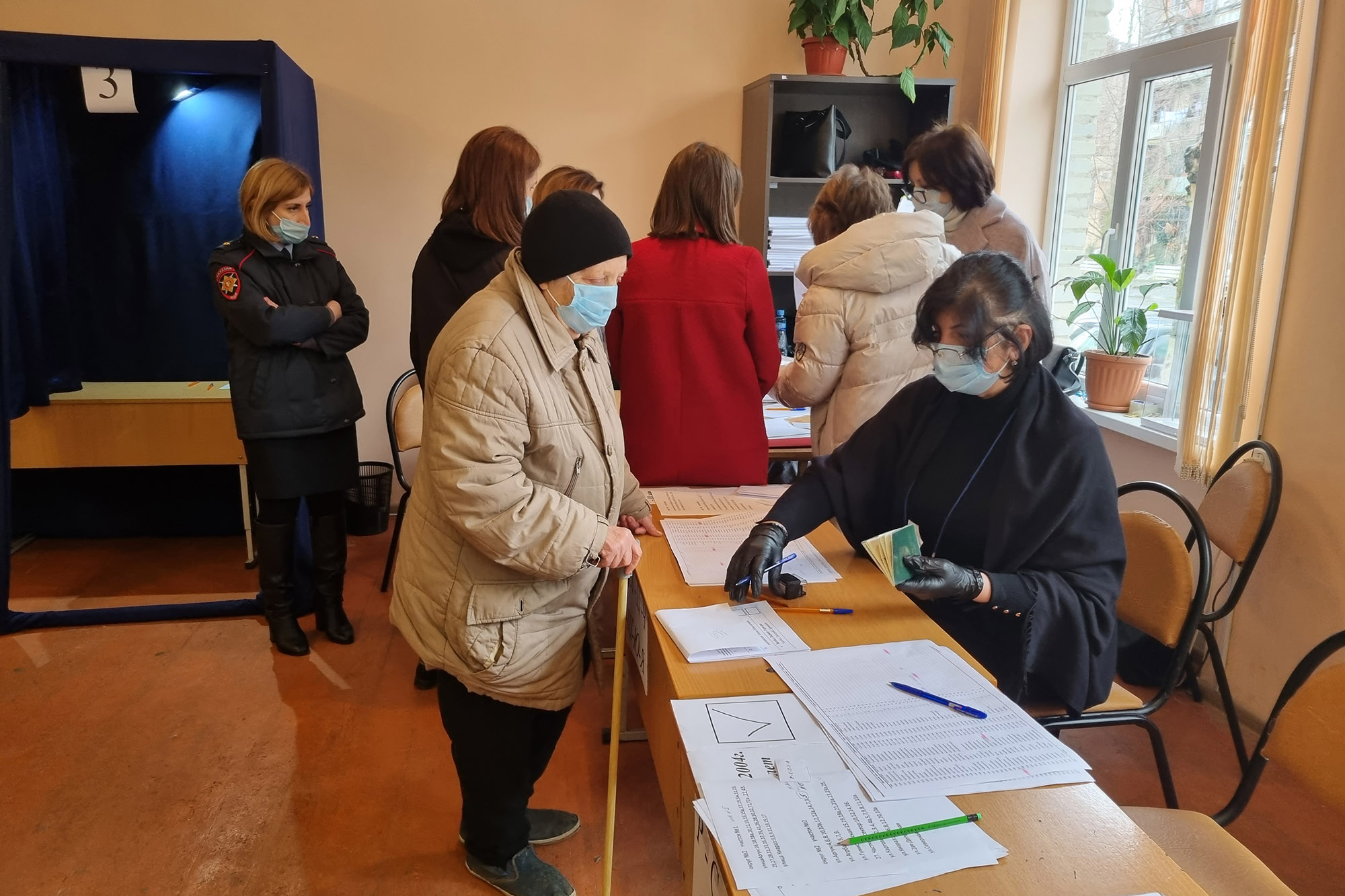
The CEC reported not a single violation except for one complaint, which they said had been promptly addressed.
Of the 123 candidates, only 14 ran on tickets of political parties while the rest were fielded as independents, many by ad hoc ‘initiative groups’.
The main political parties in Abkhazia include the pro-government Amtsakhara party and Popular Front of Abkhazia, also known to be sympathetic to the current authorities. Others are opposition groups Apsny, the Popular Party of Abkhazia, and Economic Development of Abkhazia.
Given the high number of runoffs, the challenge President Aslan Bkzhaniya is expected to face from the new legislature is not yet clear.
Among those winning in the first run, according to preliminary results, are five MPs from the outgoing convocation as well as a number of former officials, including former mayors of Sukhumi (Sukhum) Kan Kvarchiya (2019–2020) and Adgur Kharazia (2002–2003).
In December 2020, Kharazia was put under house arrest facing criminal charges for allegedly injuring a resident of Sukhumi with a gunshot, something that Abkhazians frequently remembered after seeing his victory.
An Abkhazian citizen is eligible to run as an MP if they are at least 25 years old, have no criminal record, do not suffer from dependence on alcohol or other substance or ‘chronic and protracted mental disorder’.
The Central Election Commission said that ‘25 international observers’ followed the elections — including representatives from the Russian Central Election Commission, both chambers of the Russian parliament, Transnistria, South Ossetia, the Lugansk People’s Republic, and the Parliamentary Assembly of the Union of Belarus and Russia.
Abkhazia has been racked by political unrests in recent years, including anti-government protests last December demanding the resignation of Aslan Bzhaniya which turned violent. Among the demands of protesters was the extension of the now-outgoing parliament by a year and amending the constitution to introduce a proportional element in electing lawmakers, demands that never realised.
On election day, Georgia, which controlled Abkhazia until the military conflict in the early 1990s, condemned the vote as ‘yet another futile attempt to legitimise the ongoing illegal occupation of the two regions [along with South Ossetia] being integral parts of Georgia’.
Disenfranchised and underrepresented
The election, as in previous years, was held on the background of the lingering problem of disenfranchised residents of Gali (Gal) District, a Georgian-populated region bordering the Georgian-controlled region of Mingrelia.
The overwhelming majority of Gali residents, who hold Georgian citizenship, remained ineligible to vote, as Abkhazian citizenship was stripped of them several years ago. In the region, which has a population of tens of thousands of ethnic Georgians, less than 2,000 voters were included in the voters’ list in the corresponding 35th District.
In January, the Congress of the People of Abkhazia, a newly-launched group, faced backlash from the opposition Amtsakhara party and the veterans’ union Aruaa after suggesting ‘documenting’ Gali residents that to this day mostly hold residence permits.
On Sunday, the CEC reported that 1,140 people cast their vote in Gali District, making Timur Shergelia, the former head of the local branch of Abkhazia’s State Security Service, the winner.
The incoming parliament will not include any lawmaker with an ethnic Russian background.
Among the already elected MPs are three ethnic Armenians. All of them faced rivals in their constituencies who were also of an Armenian background.
According to the same Commission, out of 123 candidates, 16 were women, and 48 were below 40.
‘Less dependence’ on Russia
Casting his vote in his home village of Tamysh on Saturday, Abkhazian President Aslan Bzhania underlined the challenges Abkhazia faced ahead, including a ‘still difficult’ situation regarding the coronavirus in the region as well as expected ‘inflation, price hikes’ following Western sanctions against Russia.
Notably, 25 out of 123 candidates who ran on Saturday had indicated they were unemployed by the time of registering their candidacy.
On 7 March, local media reported an 8%–10% hike in petrol prices, which triggered a protest by car owners a day earlier on Freedom Square in Sukhumi.
In addition to fears over the fallout of sanctions and the lingering coronavirus pandemic, which has officially killed 666 people as of 13 March, Abkhazia has also been experiencing electricity shortages leading to intermittent scheduled power cuts. Chernomorenergo, the local power distribution company, cited low water levels in reservoirs and insufficient power from Russia as the reasons behind the shortage.
The Enguri hydroelectric dam, the main source of power for Abkhazia, is jointly run by Abkhazian and Georgian authorities.
The biggest headache for the Abkhazian government, however, remains the expected downsizing of direct financial assistance from Russia.
On 10 March, a day before the elections, Russian Deputy Economy Minister Dmitry Volvach talked about Abkhazia and South Ossetia becoming less dependent on Russian subsidies.
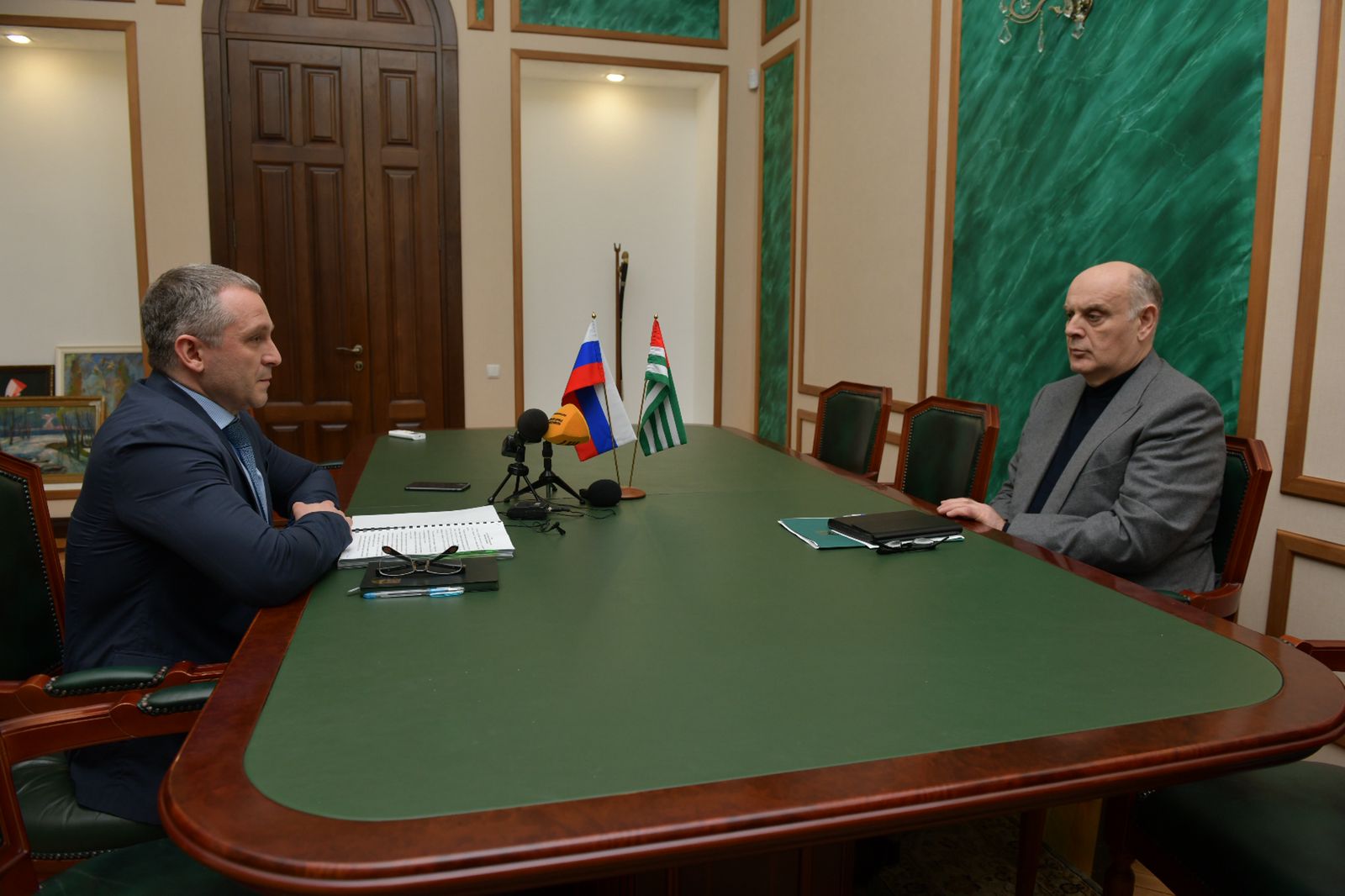
‘Now our task is to help them become a little more independent subjects of international economic relations’, Volvach told Russian state-run agency Tass. Volvach noted that in 2021 alone, Russia spent ₽5 billion ($68 million in 2021) on sustaining Abkhazia.
The biggest upset in Abkhazian-Russian relations remains a ban on foreigners from acquiring real estate in Abkhazia, something Abkhaz authorities have tried to retain despite pressure from Moscow, in order to avoid domestic backlash.
Last November President Bzhaniya took a political hit for floating the idea of allowing Russians to buy real estate in Abkhazia.
‘Wholehearted support’ to Russia
Amidst signals from Kremlin about cutting direct financial aid to Abkhazia, both the Abkhazian authorities and opposition groups have showed strong support for Russia in its ongoing military assault on Ukraine.
On 11 March, the day before the parliamentary vote, the authorities organised a gathering at the Dinamo Stadium in Sukhumi to support Russia’s ‘special military operation’.
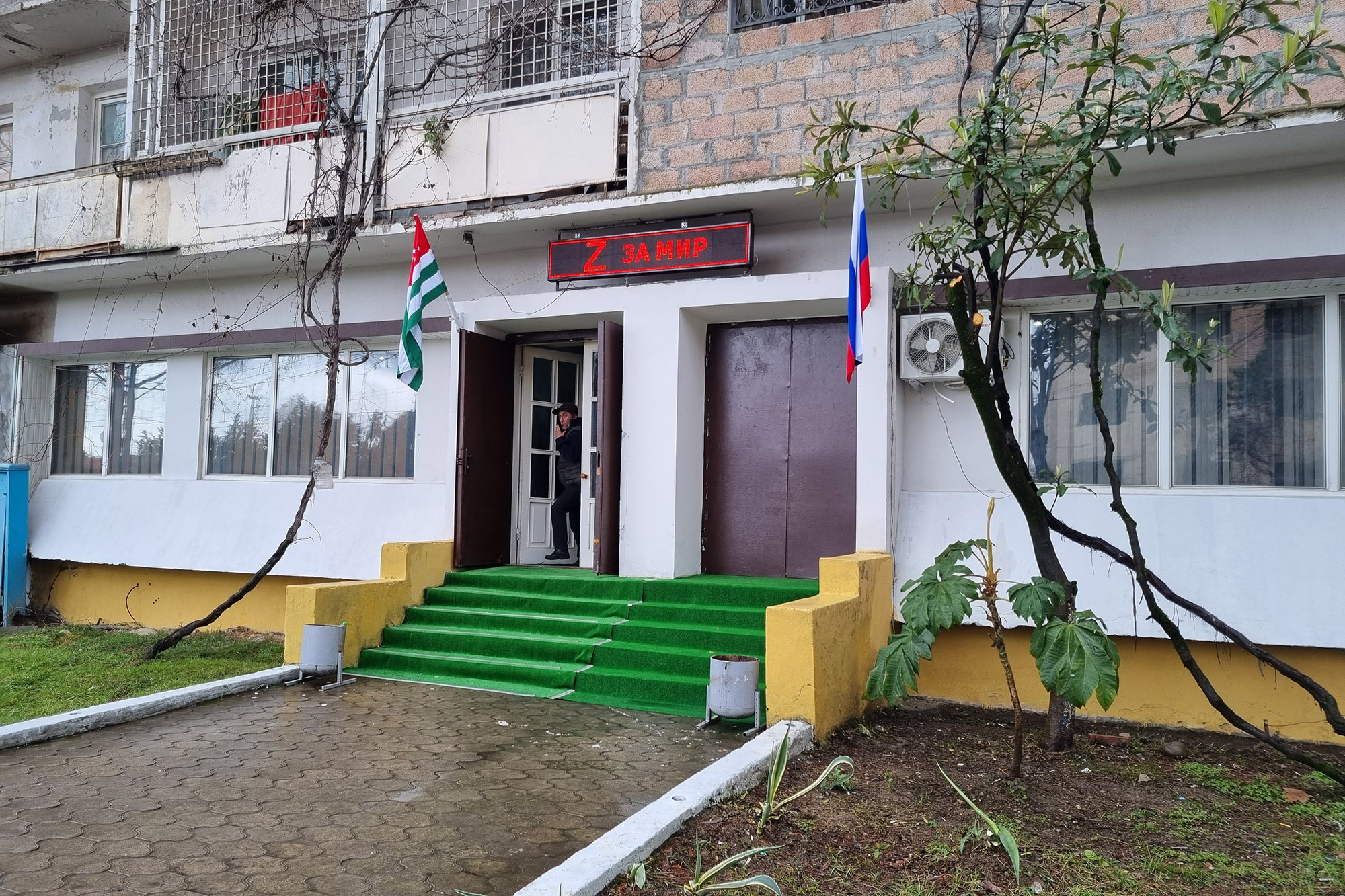
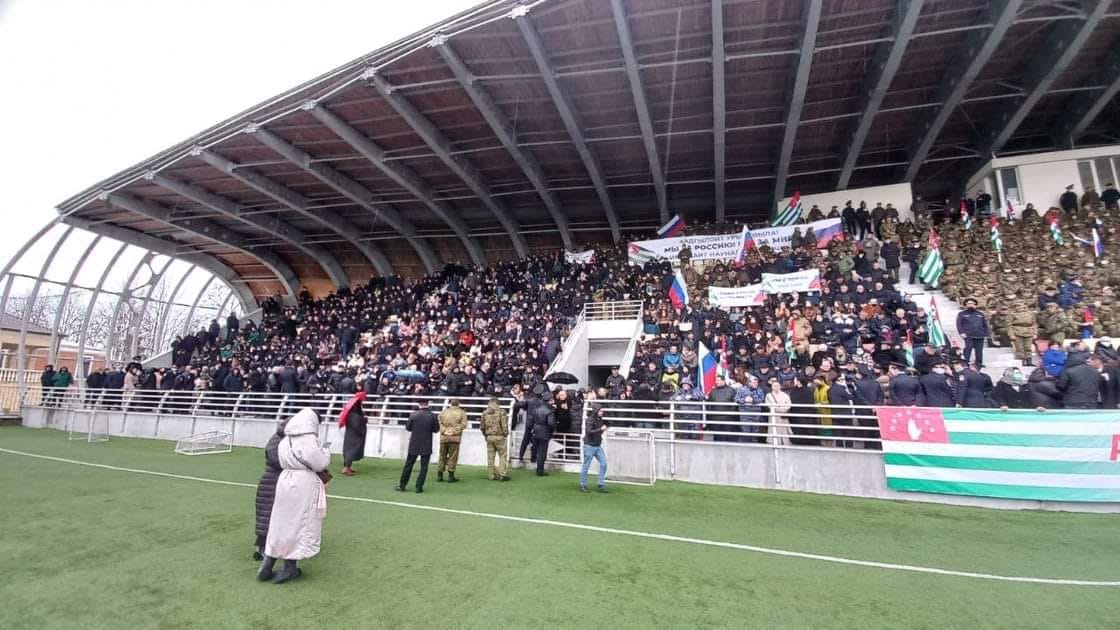
In a speech at a pro-Russia gathering on 11 March, President Bzhaniya expressed ‘wholehearted support’ to Russian President Vladimir Putin, condemned NATO’s expansion eastward, and called Ukraine an ‘instrument’ of Western ‘imperialism’ that he said was seeking to ‘establish a unipolar world’.
Before Putin’s announcement of the attack on Ukraine on 24 February, Abkhazia said they had received around 90 refugees from Ukraine’s breakaway regions. Abkhazia, however, recognised the independence of Donetsk People’s Republic and Lugansk People’s Republic only on 25 February, after Putin announced the military incursion deeper into Ukraine.
[Read more on OC Media: Abkhazia recognises Ukraine’s Donetsk and Luhansk]
Around the time polls were due to close in Abkhazia, Ukraine’s General Staff of the Armed Forces claimed that Russia was involving ‘mercenaries’ from Abkhazia and South Ossetia in their military campaign against Ukraine, something the Abkhazian authorities have not commented on so far.
For ease of reading, we choose not to use qualifiers such as ‘de facto’, ‘unrecognised’, or ‘partially recognised’ when discussing institutions or political positions within Abkhazia, Nagorno-Karabakh, and South Ossetia. This does not imply a position on their status.

